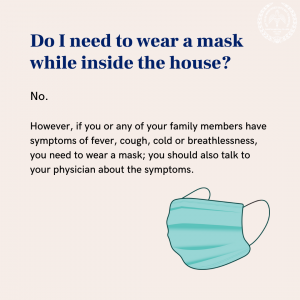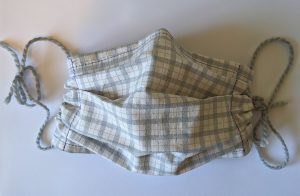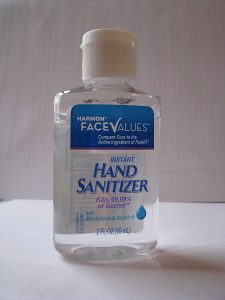
https://www.cdc.gov/coronavirus/2019-ncov/faq.html
https://www.fda.gov/emergency-preparedness-and-response/coronavirus-disease
https://www.oie.int/en/scientific-expertise
https://www.ecdc.europa.eu/en/covid-19/questions-answers
No. You only need to wear a mask inside if any of your family members have symptoms of cough, fever cold and breathlessness.

Yes, you can make your own cloth mask. Once stitched, it should be washed thoroughly with detergent and sun dried completely. Avoid touching the front of the mask as it might contain microorganisms if you have come in contact with infected or suspected patients
Wash your hands with soap for 20 seconds, avoid touching your eyes, nose or mouth. Clean your groceries with detergent or soap water. Wash milk packet covers or home delivered food items especially if it has been handled by people from outside your home.
No, simple hand wash with soap for 20 seconds is sufficient.

No. Always wash your hands with water before eating as sanitizers contain chemical which should not be ingested.
Yes, you can order takeaways. Make sure to wash your hands with soap and water both before and after accepting the takeaway.
Both, the Government of India and WHO DO NOT recommend making sanitisers at home as they require chemicals to be mixed in a clean and sterile condition. Few homemade sanitisers shown in internet containing Aloe Vera, essential oils but these DO NOT have any effect on the virus.
To date food has not been identified as a route for transmission of the virus. It is recommended to wash hands thoroughly with soap and warm water before handling food prior to cooking. In addition, good care has to be taken when handling raw meat, cook it thoroughly and clean the benchtops with soap and hot water thoroughly after the raw meat handling is completed. Also when you are sick, do not be involved in handling of food in the kitchen.
No, you should not go for any beauty treatment at this time as there is close interaction for a prolonged time, between the client and the beautician, which is highly discouraged.
Yes. Currently, there is limited scientific evidence with regard to the role of human transmitting to pets.
However, because animals and people can sometimes have similar diseases, it is still advised that people who are sick with COVID-19 have limited contact with pet animals.
There are different types of corona virus that can infect animals and can be transmitted to animals and human. There is no evidence of transmission from pet to human, though there have been isolated reports of COVID-19 positive cases in animals. It is better to practice basic principles of hygiene when you interact with your home pets.
Study has shown that the virus can survive up to 24 hours on cardboard, under controlled settings. There is no case reported of any transmission through handling packages. So it is recommended to use an alcohol based hand rub/sanitiser/ thoroughly wash your hands with soap and water before accepting the package from the courier supplier and also a second time after accepting this package from the supplier.
Few regions in our country has advised not to eat meat or fish. However there is no scientific evidence to say to say that virus transmits through cooked meat or fish. But Do Not eat any uncooked raw meat or fish food material. If cooking meat or fish make sure it is prepared separately. Cook all raw meat sufficiently.
Funerals and cremations in the presence of max. 15 persons are allowed, subject to social distancing measures and without any exposure of the deceased body. Precautionary measures like wearing face mask, avoiding handshakes, washing hands or using alcohol based hand sanitisers should be followed.